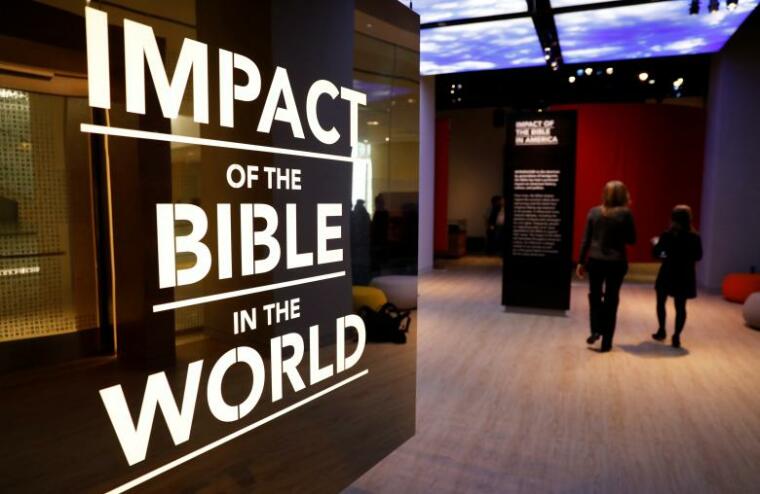Secularist group accuses Bible museum of indoctrinating visitors

The Freedom From Religion Foundation (FFRF) has accused the newly-opened Museum of the Bible in Washington, D.C. of indoctrinating its visitors and said that it has taken steps to ensure that the institution has not received any taxpayer funds.
In an article posted on Patheos.com, Andrew L. Seidel, Director of Strategic Response for the FFRF, said that the group has been monitoring the progress of the museum for years and it has filed Freedom of Information Act requests to make sure that no taxpayer funds have been received during its construction.
Seidel noted that in 2014, the FFRF had tried to prevent Steve Green, who had funded the museum, from implementing a Bible course in Oklahoma public schools.
He contended that the materials in that course had a "clear Christian bias" and said that he expects to see "more of the same in the Museum of the Bible."
"Indoctrination, not education. Preaching, not teaching. Just like the bible class, it will try to prove the truth of the bible. And while the structure may be impressive and there may be some wonderful artifacts (hopefully not purloined), the underlying arguments will likely fall as flat as the class," he wrote.
The $500 million museum, which opened to the public on Saturday, features a large collection of Christian and Hebrew artifacts, as well as exhibits on the Bible's influence on society, including media, fashion and events in American and world history.
In a recent interview with The New York Times, Tony Zeiss, the museum's executive director, noted that the museum consulted with 100 biblical scholars in an effort to avoid appearing partisan.
Seidel, however, suggested that a closer look at the museum's exhibits "will reveal a disturbing bias and dearth of scholarship."
Other critics have also complained about the museum's lack of representation of other religious points of view.
Joel S. Baden, a professor of the Hebrew Bible at Yale University, lamented that the museum puts too much emphasis on American Protestantism and leaves out other faiths, such as Mormonism and Islam.
Zeiss has said that the museum's aim is to educate people about the Bible and to show the history and influence of what he described as the world's most influential texts.
"Things are divisive, but we will not get into any of the cultural or social debates if possible. We just want to present the Bible as it is, and let people make up their own minds," he said.
The administrators of the museum have said that the primary goal of its exhibits is to get the people to read the Bible not necessarily to believe in it.
 Christians don't have to affirm transgenderism, but they can’t express that view at work: tribunal
Christians don't have to affirm transgenderism, but they can’t express that view at work: tribunal Archaeology discovery: Medieval Christian prayer beads found on Holy Island
Archaeology discovery: Medieval Christian prayer beads found on Holy Island Presbyterian Church in America votes to leave National Association of Evangelicals
Presbyterian Church in America votes to leave National Association of Evangelicals Over 50 killed in 'vile and satanic' attack at Nigerian church on Pentecost Sunday
Over 50 killed in 'vile and satanic' attack at Nigerian church on Pentecost Sunday Ukrainian Orthodox Church severs ties with Moscow over Patriarch Kirill's support for Putin's war
Ukrainian Orthodox Church severs ties with Moscow over Patriarch Kirill's support for Putin's war Islamic State kills 20 Nigerian Christians as revenge for US airstrike
Islamic State kills 20 Nigerian Christians as revenge for US airstrike Man who served 33 years in prison for murder leads inmates to Christ
Man who served 33 years in prison for murder leads inmates to Christ


 Nigerian student beaten to death, body burned over ‘blasphemous’ WhatsApp message
Nigerian student beaten to death, body burned over ‘blasphemous’ WhatsApp message 'A new low': World reacts after Hong Kong arrests 90-year-old Cardinal Joseph Zen
'A new low': World reacts after Hong Kong arrests 90-year-old Cardinal Joseph Zen Iran sentences Christian man to 10 years in prison for hosting house church worship gathering
Iran sentences Christian man to 10 years in prison for hosting house church worship gathering French Guyana: Pastor shot dead, church set on fire after meeting delegation of Evangelicals
French Guyana: Pastor shot dead, church set on fire after meeting delegation of Evangelicals ‘Talking Jesus’ report finds only 6% of UK adults identify as practicing Christians
‘Talking Jesus’ report finds only 6% of UK adults identify as practicing Christians Mission Eurasia ministry center blown up in Ukraine, hundreds of Bibles destroyed: 'God will provide'
Mission Eurasia ministry center blown up in Ukraine, hundreds of Bibles destroyed: 'God will provide' Church holds service for first time after ISIS desecrated it 8 years ago
Church holds service for first time after ISIS desecrated it 8 years ago Burger King apologizes for 'offensive campaign' using Jesus' words at the Last Supper
Burger King apologizes for 'offensive campaign' using Jesus' words at the Last Supper Uganda: Muslims abduct teacher, burn him inside mosque for praying in Christ’s name
Uganda: Muslims abduct teacher, burn him inside mosque for praying in Christ’s name